29 start with P start with P

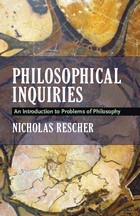
Among his many topics, Rescher discusses knowledge and the unattainablity of absolutes, skepticism and its self-defeating nature, the limits of science vs. the limits of cognition, refuting reality as mind-independent, and idealism and divining our role in nature. He considers the universe and intelligence as the product of intelligent design, science and religion as non-conflicting and purposeful pursuits, and determinism and other fallacies surrounding the concept of free will. Rescher views morality in its hierarchal structure, its applicability to human coexistence, and its ontological commitment to the enhancement of value for ourselves and our world. He examines questions of authority and the problem of judging past actions or knowledge by present standards. Overall, he argues for philosophy as an unavoidable tool for rational, cogent responses to large questions.
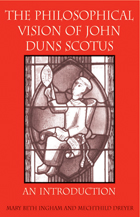
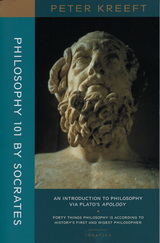
“If only every introductory course were as engaging as Philosophy 101 by Peter Kreeft! Kreeft offers a marvelous way of using Plato’s Apology both to introduce the whole scope of philosopher and to evoke a personal response. Even the diffident freshman, prone to keeping a new subject like philosopher as arm’s length, will feel the enchantment of love-for-wisdom that philosophy is supposed to be.” – Joseph W. Koterski, S.J., chair, Department of Philosophy, Fordham University
“A terrific introduction to philosophy through this not uncontroversial commentary on Plato’s Apology. Not everyone will agree that Socrates provided the best possible defense for himself nor that he intended to. But Kreeft’s is an eminently defensible reading of the Apology and will awaken many a student to the delights of Plato and Philosophy. The comparisons of Socrates with Christ are fascinating. This book will go a long way to consoling those who are not privileged to have Socrates or Kreeft as teachers in the flesh.” – Janet Smith, Sacred Heart Major Seminary, Detroit
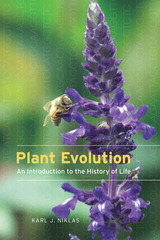
Tapping such wide-ranging topics as genetics, gene regulatory networks, phenotype mapping, and multicellularity, as well as paleobotany, Karl J. Niklas’s Plant Evolution offers fresh insight into these differences. Following up on his landmark book The Evolutionary Biology of Plants—in which he drew on cutting-edge computer simulations that used plants as models to illuminate key evolutionary theories—Niklas incorporates data from more than a decade of new research in the flourishing field of molecular biology, conveying not only why the study of evolution is so important, but also why the study of plants is essential to our understanding of evolutionary processes. Niklas shows us that investigating the intricacies of plant development, the diversification of early vascular land plants, and larger patterns in plant evolution is not just a botanical pursuit: it is vital to our comprehension of the history of all life on this green planet.
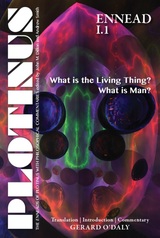
Ennead I.1 is a succinct and concentrated analysis of key themes in Plotinus' psychology and ethics. It focuses on the soul-body relation, discussing various Platonic, Aristotelian, and Stoic views before arguing that there is only a soul-trace in the body (forming with the body a “compound”), while the reasoning soul itself is impassive and flawless. The soul-trace hypothesis is used to account for human emotions, beliefs, and perceptions, and human fallibility in general. Its problematic relation to our rational powers, as well as the question of moral responsibility, are explored. Plotinus develops his original and characteristic concept of the self or “we,” which is so called because it is investigated as something common to all humans (rather than a private individual self), and because it is multiple, referring to the reasoning soul or to the “living thing” composed of soul-trace and body. Plotinus explores the relation between the “we” and consciousness, and also its relation to the higher metaphysical entities, the Good, and Intellect.

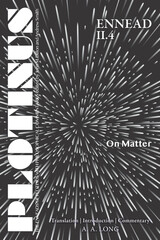
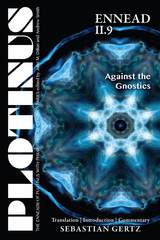
How was the universe created, and what is our place within it? These are the questions at the heart of Plotinus’ Against the Gnostics. For the Gnostics, the universe came into being as a result of the soul’s fall from intelligible reality—it is the evil outcome of a botched creation. Plotinus challenges this, and insists that the soul’s creation of the world is the necessary consequence of its contemplation of the ideal forms. While the Gnostics claim to despise the visible universe, Plotinus argues that such contempt displays their ignorance of the higher realities of which the cosmos is a beautiful image.
Against the Gnostics is a polemical text. It aims to show the superiority of Plotinus’ philosophy over that of his Gnostic rivals, and poses unique challenges: Plotinus nowhere identifies his opponents by name, he does not set out their doctrines in any great detail, and his arguments are frequently elliptical. The detailed commentary provides a guide through these difficulties, making Plotinus’ meandering train of thought in this important treatise accessible to the reader.
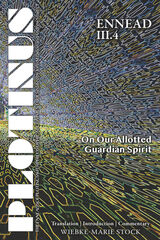
The introduction offers an overview of ancient demonologies, starting with Homer and the Presocratics, and is followed by an in-depth examination of Plato, the Stoics, Plotinus, and later Neoplatonic developments. As such the book presents Plotinus’ specific rationalizing response to the idea of a guardian spirit in the context of ancient philosophical demonologies.
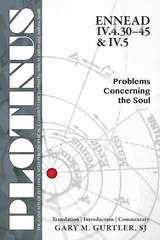
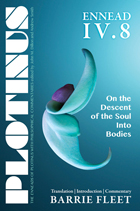
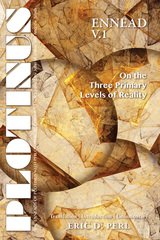
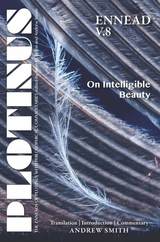
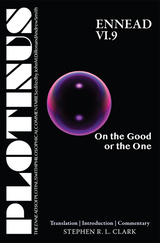
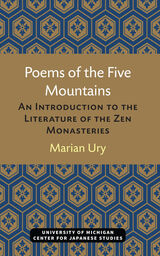

Born eighty years ago in Lithuania, Czeslaw Milosz has been acclaimed “one of the greatest poets of our time, perhaps the greatest” (Joseph Brodsky). This self-described “connoisseur of heavens and abysses” has produced a corpus of poems, essays, memoirs, and fiction of such depth and range that the reader's imagination is moved far beyond ordinary limits of consciousness. In The Poet's Work Leonard Nathan and Arthur Quinn follow Milosz's wanderings in exile from Poland to Paris to Berkeley as they chart the singular development of his art. Relating his life and his works to the unfolding of his thought, they have crafted a lucid reading of Milosz that far surpasses anything yet written on this often enigmatic poet.
The Poet's Work is not only a solid introduction to Milosz; it is also a unique record of the poet's own interpretations of his work. As colleagues of Milosz at Berkeley, Nathan and Quinn had long, detailed discussions with the poet. It is this spirit of collaboration that brings a sense of immediacy and authority to their seamless study. Nathan and Quinn reveal as never before why Milosz is a true visionary, a poet of ideas in history. And they show how the influence of Blake, Simone Weil, Dostoevsky, Lev Shestov, and Swedenborg, together with Henry Miller, Allen Ginsberg, and Robinson Jeffers, has enriched his vision. Milosz's lifelong experience of totalitarian regimes that exalt science and technology over individual needs and aspirations, his acute sense of alienation as an émigré, and his humanistic zeal and belief in the primacy of living have brought a prismatic quality to his poetry.
At seventy, Milosz spoke of himself as an “ecstatic pessimist.” In their sensitive mapping of his art, Nathan and Quinn skillfully demonstrate that Milosz's global influence has been achieved by the ever-shifting balance he strikes between ecstasy and pessimism. Irony and humor are never far from this book, which not only communicates Milosz's polyphonic message but also evokes his uniquely humane sensibility. The Poet's Work is an illuminating introduction to Milosz that will inform and engage scholars and general readers for years to come.

To what extent do developments in global communication enhance or undermine autonomy? As the world's media companies continue to merge, we are moving towards an ever more commercially driven system of global information. Wilkin argues that private ownership provides an increasingly powerful obstacle to human autonomy, and that the neo-liberal institutional and policy framework – now a global tendency – raises major problems for the attainment of human security. At the same time it has provided the ideological justification for the extension of private power into ever wider areas of public life. Changes in global communication reflect wider tendencies to enhance the power of global elites at the expense of working people and the author illustrates how and why these changes have taken place and the forms of opposition that have arisen in response to them.

Since the right-wing, Hindu-nationalist government of Narendra Modi’s Bharatiya Janata Party (BJP) came to power at the national level in 2014, and with its consolidation of power in the 2019 general election, India has witnessed a significant realignment of its national politics and a shift toward the right of the political spectrum. The Politics of India under Modi provides a detailed overview of India’s political trends, economic prospects, and international relations in the twenty-first century.
This book is designed as a supplement and update for existing syllabi that trace India’s political economy from the birth of the republic to the quest for economic liberalization and great power status. Undergraduates and scholars interested in India’s foreign policy and political reform will find value in this timely book.
“The subject of this book is extremely compelling and important, as well as timely. BJP rule and the Modi regime, it is now clear, represent some critical turning points in Indian politics, which have yet to be analyzed in depth academically by experts. I see this book as a key first step in this process.”
-Rina Verma Williams, School of Public and International Affairs at the University of Cincinnati
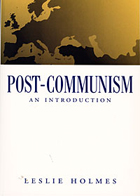


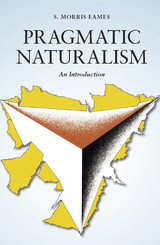
It is said that America came of age intellectually with the appearance of the pragmatic movement in philosophy. Pragmatic Naturalism presents a selective and interpretative overview of this philosophy as developed in the writings of its intellectual founders and chief exponents—Charles Sanders Peirce, William James, George Herbert Mead, and John Dewey. Mr. Eames groups the leading ideas of these pragmatic naturalists around the general fields of “Nature and Human Life,” “Knowledge,” “Value,” and “Education,” treating the primary concerns and special emphasis of each philosopher to these issues.
Philosophy students, teachers of philosophy, and general readers will find this book a comprehensive overview of American philosophy.

Landscaping with native plants has encouraged gardeners from the Midwest and beyond to embark on a profound scientific, ecological, and emotional partnership with nature. Benjamin Vogt shares his expertise with prairie plants in a richly photographed guide aimed at gardeners and homeowners, making big ideas about design approachable and actionable. Step-by-step blueprints point readers to plant communities that not only support wildlife and please the eye but that rethink traditional planting and maintenance. Additionally, Vogt provides insider information on plant sourcing, garden tools, and working with city ordinances. This book will be an invaluable reference in sustainable garden design for those wanting both beautiful and functional landscapes.
Easy to use and illustrated with over 150 color photos, Prairie Up is a practical guide to artfully reviving diversity and wildness in our communities.

“Precious volumes,” or pao-chüan, were produced by popular sects in the Ming and early Qing dynasties. These scriptures were believed to have been divinely revealed to sect leaders and contain teachings and ritual instructions that provide valuable information about a lively and widespread religious tradition outside mainstream Confucianism, Taoism, and Buddhism. Largely neglected until now, they testify to the imagination and devotion of popular religious leaders.
This book, the most detailed and comprehensive study of pao-chüan in any language, studies 34 early examples of this literature in order to understand the origins and development of this textual tradition. Although the work focuses on content and structure, it also treats the social context of these works as well as their transmission and ritual use.
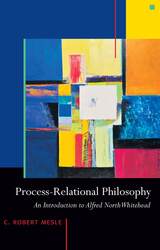
Process thought is the foundation for studies in many areas of contemporary philosophy, theology, political theory, educational theory, and the religion-science dialogue. It is derived from Alfred North Whitehead's philosophy, known as process theology, which lays a groundwork for integrating evolutionary biology, physics, philosophy of mind, theology, environmental ethics, religious pluralism, education, economics, and more.
In Process-Relational Philosophy, C. Robert Mesle breaks down Whitehead's complex writings, providing a simple but accurate introduction to the vision that underlies much of contemporary process philosophy and theology. In doing so, he points to a "way beyond both reductive materialism and the traps of Cartesian dualism by showing reality as a relational process in which minds arise from bodies, in which freedom and creativity are foundational to process, in which the relational power of persuasion is more basic than the unilateral power of coercion."
Because process-relational philosophy addresses the deep intuitions of a relational world basic to environmental and global thinking, it is being incorporated into undergraduate and graduate courses in philosophy, educational theory and practice, environmental ethics, and science and values, among others. Process-Relational Philosophy: A Basic Introduction makes Whitehead's creative vision accessible to all students and general readers.

A new critical text for Proverbs drawing from many manuscripts
This first volume of The Hebrew Bible: A Critical Edition series, features a critical text of Proverbs with extensive text-critical introductions and commentaries. This and future HBCE volumes bring together a scholar’s critical decisions into a single text. construct an eclectic text, drawing from many manuscripts or placing entirely variant texts side by side. A common approach for critical editions of other ancient books, including the New Testament, the eclectic approach and scope used in the HBCE is a first of its kind for the Hebrew Bible.
Features:
- Emendations set in context rather than singly and marginally
- Introduction that sets out the method and purpose of the volume
- Extensive list of abbreviations and sigla

The book follows major themes, highlighting the similarities and differences among influential thinkers and schools of thought. At the same time, Psychoanalytic Theory is structured so that the chapters can be read in any order. Each one includes an introductory overview and summary, as well as biographical and historical material for each theorist discussed. This book is an essential starting point for any exploration of the contribution of psychoanalysis to contemporary theory.
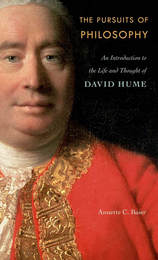
Marking the tercentenary of David Hume's birth, Annette Baier has created an engaging guide to the philosophy of one of the greatest thinkers of Enlightenment Britain. Drawing deeply on a lifetime of scholarship and incisive commentary, she deftly weaves Hume’s autobiography together with his writings and correspondence, finding in these personal experiences new ways to illuminate his ideas about religion, human nature, and the social order.
Excerpts from Hume’s autobiography at the beginning of each chapter open a window onto the eighteenth-century context in which Hume’s philosophy developed. Famous in Christian Britain as a polymath and a nonbeliever, Hume recounts how his early encounters with clerical authority laid the foundation for his lifelong skepticism toward religion. In Scotland, where he grew up, he had been forced to study lists of sins in order to spot his own childish flaws, he reports. Later, as a young man, he witnessed the clergy’s punishment of a pregnant unmarried servant, and this led him to question the violent consequences of the Church’s emphasis on the doctrine of original sin. Baier’s clear interpretation of Hume’s Treatise of Human Nature explains the link between Hume’s growing disillusionment and his belief that ethics should be based on investigations of human nature, not on religious dogma.
Four months before he died, Hume concluded his autobiography with a eulogy he wrote for his own funeral. It makes no mention of his flaws, critics, or disappointments. Baier’s more realistic account rivets our attention on connections between the way Hume lived and the way he thought—insights unavailable to Hume himself, perhaps, despite his lifelong introspection.
READERS
Browse our collection.
PUBLISHERS
See BiblioVault's publisher services.
STUDENT SERVICES
Files for college accessibility offices.
UChicago Accessibility Resources
home | accessibility | search | about | contact us
BiblioVault ® 2001 - 2024
The University of Chicago Press









